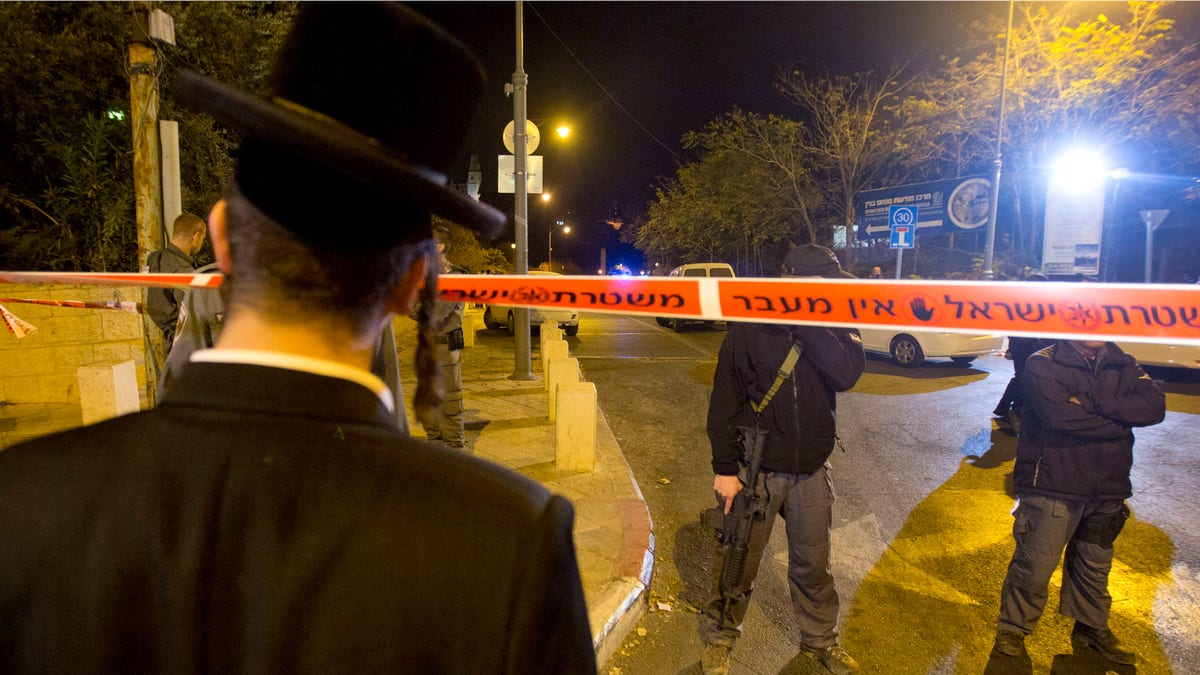
Oct 29, 2014: An ultra-Orthodox Jewish man looks as Israeli police officers stand guard at the scene of a shooting in Jerusalem (AP)
The suspect in the shooting of U.S.-born activist Rabbi Yehuda Glick reportedly was killed by police in East Jerusalem early Thursday.
The Times of Israel reported that police arrived at the suspect's house in the Abu Tor neighborhood and were attempting to arrest the suspect when they came under fire. Israeli police spokesman Micky Rosenfeld posted on Twitter that the suspect was killed in the ensuing shootout.
The paper reported that the Shin Bet security service confirmed the death of the suspect, described as a 32-year-old Palestinian who had spent time in an Israeli prison. His name was given as Moatez Higazi, an activist for the Islamic Jihad terror group.
Shortly after Higazi was shot dead, clashes broke out in Abu Tor, with Palestinians hurling stones at the riot police, who responded with rubber bullets to suppress the demonstration. Residents gathered on rooftops, chanting pro-Palestinian slogans while police set up checkpoints to control access in and out of the neighborhood.
Glick remained hospitalized in serious condition after Wednesday night's shooting, which took place outside a memorial center in the Israeli capital by the motorcycle-riding gunman, who immediately fled the scene. The Times of Israel reported that Glick was shot three times, and quoted eyewitnesses who said the gunman briefly spoke to him, saying "You've made me very angry" in Hebrew with a heavy Arabic accent.
Glick is chairman for the Joint Committee of Temple Organizations and has a long history of advocating for Jewish prayer rights at the Temple Mount, a hilltop compound in Jerusalem's Old City that has been a flashpoint for violence in the current tension throughout Jerusalem. Prior to the shooting, Glick had been speaking on the topic at a conference promoting Jewish access to the holy site.
"The writing was on the wall, the ceiling and the windows. Every Jew who goes up to the Temple Mount is a target for violence," Likud lawmaker Moshe Feiglin told the Associated Press.
In recent months, clashes have erupted at Jerusalem's most sensitive holy site between Palestinian stone throwers and Israeli police, over what Palestinians see as Jewish encroachment on the site, the holiest in Judaism and the third holiest in Islam. Israel maintains that it allows free prayer to all, but Palestinians claim Israel is unilaterally widening access to accommodate larger numbers of Jewish worshippers.
Amid the violence, Palestinian President Mahmoud Abbas recently has called for Jews to be banned from the site, urging Palestinians to guard the compound from visiting Jews, who he referred to as a "herd of cattle."
Israeli Prime Minister Benjamin Netanyahu said that he has yet to hear a word of condemnation from the world against Abbas' incitement to violence.
"The international community must stop its hypocrisy and act against the inciters," Netanyahu said.
Defense Minister Moshe Yaalon also reiterated accusations against Abbas Thursday.
"The assassination attempt of Yehuda Glick is another serious step in the Palestinian incitement against Jews and against the state of Israel," Yaalon said. "When Abu Mazen (Abbas) spreads lies and venom about the rights of Jews to worship in their land the result is terror, as we saw yesterday."
In a statement, Abbas' office did not condemn the shooting of Glick but lashed out at Israel for closing the volatile site.
"Jerusalem, including its Islamic and Christian holy places, is a red line and touching it is in unacceptable," the statement said.
Clashes have also recently taken place elsewhere in east Jerusalem, the section of the holy city captured by Israel in 1967 and claimed by the Palestinians as their future capital.
The violence erupted over the summer after three Israeli teenagers were kidnapped and killed by militants in the West Bank. Jewish extremists retaliated by kidnapping and burning to death a Palestinian teenager in east Jerusalem, sparking violent riots.
The unrest continued throughout the summer after Israel attacked Gaza in response to heavy Hamas rocket fire. The arrival of Jewish nationalists into the heart of an Arab neighborhood, coupled with the clashes at Jerusalem's most sensitive holy site, has further fueled the tensions.
Click for more from The Times of Israel.
The Associated Press contributed to this report.
